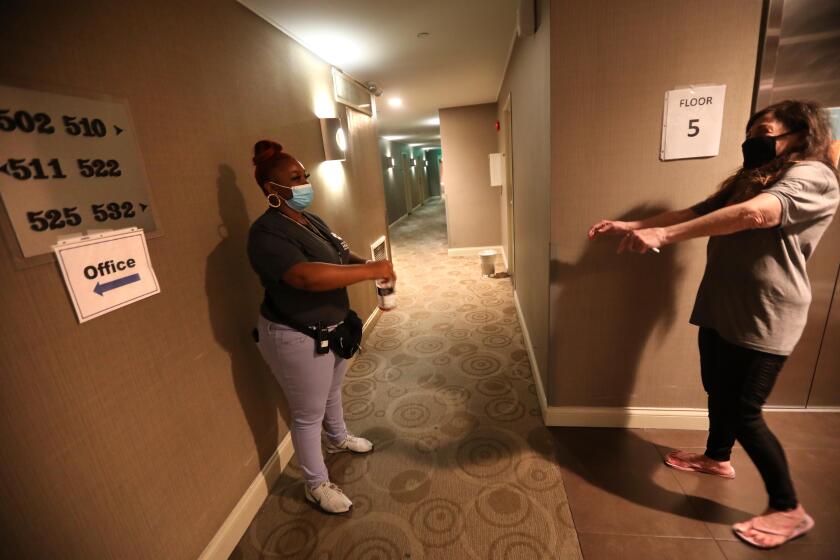L.A. voters to decide whether hotels must rent vacant rooms to homeless people

- Share via
A controversial measure that would require hotels in Los Angeles to rent vacant rooms to homeless people will go before voters in 2024, the City Council decided Friday.
The council rejected an option that would have skipped the public vote and enacted the ordinance directly, instead voting 12 to 0 to send the measure to the ballot. The initiative is backed by the hospitality worker union Unite Here Local 11, which had gathered enough signatures to place it before voters.
Friday’s council vote sets the stage for a protracted public battle over the measure, with L.A. voters having the ultimate say in 19 months. The hotel industry will probably mount vigorous opposition to the ballot measure. A number of progressive community and housing groups have backed it alongside Unite Here.
The proposal comes as city officials are gradually closing one of the signature programs set up to address homelessness during the COVID-19 pandemic: Project Roomkey, which turned multistory hotels into makeshift shelters. A number of the Project Roomkey sites have already closed.
Project Roomkey, a state program backed by federal dollars, was intended to house homeless people during the pandemic. But it never got close to its goal.
Hotel owners and operators made up a large contingent of the packed council chamber, with many arguing that the proposal would unfairly burden hotels and hurt their ability to do business.
A handful of hotel workers spoke in support of the measure, while some others opposed it.
Under the proposal, hotels would be required to regularly report the number of vacant rooms they have to the city’s housing department. A program run through the department would then make referrals and pay “fair market rate” for the lodging using prepaid vouchers. Hotels would be prohibited from discriminating against homeless Angelenos “for their participation in this program, or the fact or perception, that they are unhoused.”
That proposed voucher program has no designated source of funding and would be contingent on funding being secured by July 1, 2023, according to a report from the city attorney’s office.
Unite Here Local 11 spokesperson Maria Hernandez said the voucher program would set up a system for utilizing various funding streams.
“Just like with Project Roomkey, there are federal, state and local sources of funding for emergency housing, and this initiative creates a new option for using those funds to get people into housing immediately,” Hernandez said. “There are also nonprofits, churches and other private sources that are interested in buying vouchers to house those in need.”
The measure would also have significant land-use implications for new hotel development.
During his public comment, Northeast Los Angeles Hotel Owners Assn. President Ray Patel asked all the hotel owners in the room to stand up, saying their operations would be dramatically affected if the proposal was directly approved. Patel, who owns Welcome Inn in Eagle Rock, urged the city to instead use Project Roomkey’s voluntary participation as a model.
“Hotels would gladly volunteer their hotels to participate in programs as long as there’s a wraparound service, which includes mental health service, social service, 24-hour security and somebody’s there to hold their hand and help them get into permanent housing,” Patel said.
Several speakers also raised concerns about the lack of details regarding how the sweeping proposal would work.
“We have no economic data about what it will cost the city,” Stuart Waldman, president of the Valley Industry and Commerce Assn., said, noting the lack of funding source and the fact that rates had not yet been set for hotel rooms.
“Hotels did not cause the homeless problem. Hotels are not the solution for the homeless problem,” Waldman said to loud applause in the council chamber.
Richard Earle, a representative of independent hospitality insurance brokerage Petra Risk Solutions, was one of several speakers who said the program would reduce hotels’ ability to procure and maintain insurance.
“Insurance carriers will legitimately pull coverage,” Earle said. “The business is underwritten with risks that involve guests and business travelers, not residents who bring a whole set of separate implications.”
But Carly Kirchen, an organizer with Unite Here Local 11, argued that hotel operators and associations were being unfairly prejudiced against homeless Angelenos.
“The hotel operators would have you believe that every person experiencing homelessness is so sick that they are a danger to the people around them. But this myth argument misrepresents who is actually experiencing homelessness,” Kirchen said, noting that hotel workers are among those most affected by the housing crisis, with thousands of their members facing eviction.
“Even as a union member with a good-paying job, I was recently homeless due to the housing crisis in our city,” said Bambian Taft, who identified herself as a hotel minibar attendant and former housekeeper. Taft said she had recently paid out of pocket to stay at hotels with her daughters when there was “no work for me at the hotel.”
Amid a broader housing crisis, the proposal would also yoke the development of some new hotels to affordable housing construction. If existing housing units are being demolished or converted for a new hotel, the hotel would have to replace them with an equivalent number of affordable housing units, with some exemptions. These could be located on site or in the surrounding area.
In addition, the proposal would require new projects with more than 100 rooms to obtain a conditional use permit for approval. Permitting would depend on a number of factors, including market demand for the hotel and how it might affect the surrounding community.
The council’s vote puts the ballot measure onto the city’s next regularly scheduled election, which under election timing rules would be the March 5, 2024, primary.
More to Read
Sign up for Essential California
The most important California stories and recommendations in your inbox every morning.
You may occasionally receive promotional content from the Los Angeles Times.














